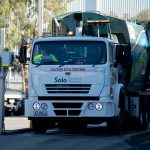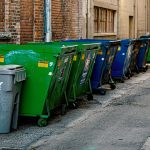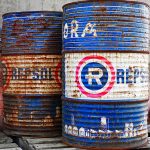12 Household Waste Items You're Probably Disposing of Wrongly (And How to Fix It!)
Disposing of your waste might seem simple enough, but many Australians contribute to recycling contamination and environmental harm through small household waste disposal mistakes. And while it’s easy to assume most items belong in either the general waste or recycling bin, some do require special handling. Misplaced waste not only contaminates otherwise recyclable material but also complicates waste management efforts.
At the Adelaide Waste and Recycling Centre (AWRC), we often encounter incorrectly sorted waste items. This article outlines 12 common household waste items that are frequently disposed of improperly, and what you can do to ensure that they are disposed of correctly.
1. Batteries
Batteries contain heavy metals and chemicals that pose environmental hazards if placed in the general waste. Yet unfortunately, many households dispose of them this way.
Correct Disposal: Batteries should never go into the recycling or general waste bins. Instead, you should take them to a designated battery drop-off. The Adelaide Waste and Recycling Centre offers a safe drop-off service for household batteries.
2. Old Medicines
Expired or unused medications are often discarded in the general waste, contributing to pollution and potentially creating a hazard.
Correct Disposal: Don’t dispose of old medicines in your general waste bin. Some pharmacies participate in the Return Unwanted Medicines (RUM) scheme, or you can contact the AWRC for advice on medical waste handling.
3. Food Scraps in Recycling Bins
Putting food scraps in the recycling bin is one of the most frequent waste sorting mistakes. This leads to recycling contamination and results in entire batches of recycling being sent to landfill instead.
Correct Disposal: Place food waste in your green bin or consider home composting. For large quantities, the Adelaide Waste and Recycling Centre can accept organic waste through our green waste program.
4. Plastic Bags in Yellow Bins
While it may seem logical to recycle plastic bags with other soft plastics, placing them in yellow bins causes sorting machinery to jam, disrupting the recycling process.
Correct Disposal: Collect soft plastics and return them to designated collection points, such as those offered at supermarkets. Alternatively, the Adelaide Waste and Recycling Centre can provide guidance on bulk soft plastic disposal.
5. Paint and Paint Tins
Paint contains chemicals that are harmful to the environment and must be treated as hazardous waste. Empty tins often retain residue, and they should not be placed in household recycling.
Correct Disposal: Find a paint take-back program or deliver leftover paint and tins to the Adelaide Waste and Recycling Centre for safe disposal.
6. Electronic Waste (e-waste)
Items like phones, computers, and televisions contain valuable and hazardous materials, and disposing of them in landfill results in lost resources and potential environmental harm.
Correct Disposal: E-waste should be dropped off at designated recycling facilities. The Adelaide Waste and Recycling Centre accepts a wide range of electronic items for responsible recycling.
7. Light Bulbs
Fluorescent and LED light bulbs contain small amounts of mercury or electronic components that should not be placed in general or recycling bins.
Correct Disposal: These bulbs require specialised handling. Drop them at recycling stations or at the AWRC for proper processing.
8. Coffee Pods
Many coffee pods are made of mixed materials – plastic, aluminium and organic residue – making them unsuitable for standard recycling.
Correct Disposal: Use manufacturer take-back programs or collect used pods for specialty recycling. Some pods might be suitable for the Adelaide Waste and Recycling Centre – check with our staff first.
9. Disposable Nappies
Disposable nappies are a significant waste problem. Many people incorrectly place them in recycling bins, creating hygiene issues and contaminating recyclables.
Correct Disposal: Nappies belong in the general waste bin. They are not recyclable through kerbside collection. For bulk disposal needs, the Adelaide Waste and Recycling Centre offers secure waste drop-off options.
10. Aerosol Cans
Empty aerosol cans are often recyclable, but full or partially full cans are hazardous and should never be placed in household bins.
Correct Disposal: Fully empty cans can go in the yellow bin. If in doubt, take them to the Adelaide Waste and Recycling Centre to ensure that they are handled safely.
11. Garden Waste in General Waste
Placing garden waste like leaves, branches, or grass clippings in general waste bins is not only inefficient but adds unnecessary volume to landfill.
Correct Disposal: Use your green waste bin or take larger loads to the Adelaide Waste and Recycling Centre’s green waste drop-off area.
12. Clothing and Textiles
Unwanted clothes and fabric are sometimes put into the recycling bin, contributing to a common waste sorting mistake. These items are not suitable for kerbside recycling.
Correct Disposal: Donate wearable clothing to charity. Torn or unwearable textiles can be taken to textile recycling programs or dropped off at the AWRC.
Household Waste Items You’re Probably Disposing of Wrongly (And How to Fix It!)
Small changes in household waste disposal habits can significantly reduce recycling contamination and environmental damage. By knowing where and how to discard items like batteries, medicines, and food scraps, you can help ensure a cleaner, more efficient waste management system in South Australia.
The Adelaide Waste and Recycling Centre is here to help households avoid common waste sorting mistakes. From hazardous materials to everyday recyclables, we offer solutions to ensure your waste is handled and disposed of correctly.
Visit Us to Learn More How to Dispose Household Waste Properly
If you’re unsure about how to dispose of a particular item or want to avoid recycling contamination, visit our facility, use our drop-off services, or explore our website for guidance on responsible household waste disposal. Let’s work together for a cleaner, greener Adelaide.
Adelaide Waste and Recycling Centre
Our friendly operators are available at the AWRC if you need to clarify any further information.


